When it comes to sowing grass in the rugged terrain of Montana, Kentucky Bluegrass is a top-notch choice. Its resilience and aesthetic appeal make it a standout contender. However, the story doesn’t end there; there’s much more to explore in the world of Montana-friendly grass seeds.
The task of cultivating a perfect lawn in Montana can be as challenging as growing one in West Virginia. Harsh winters, dry summers, and unpredictable weather patterns test your green thumb and the grass’s perseverance alike.
Continue reading to delve deeper into the different varieties of grass seeds best suited to Montana’s unique climate. Learn about their benefits, growth habits, and how they compare to the crowd-favorite Kentucky Bluegrass. Together, let’s find the ideal turf solution for your Montana lawn.
Key Takeaways
- Fine fescue, perennial ryegrass, and Kentucky bluegrass are resilient grass seed options for West Virginia lawns.
- Variations in climate, shade, and wear tolerance should be considered when choosing the ideal grass type for your yard.
- Proper establishment and maintenance practices, including soil preparation and watering, will help ensure a thriving, beautiful lawn.
Kentucky Bluegrass
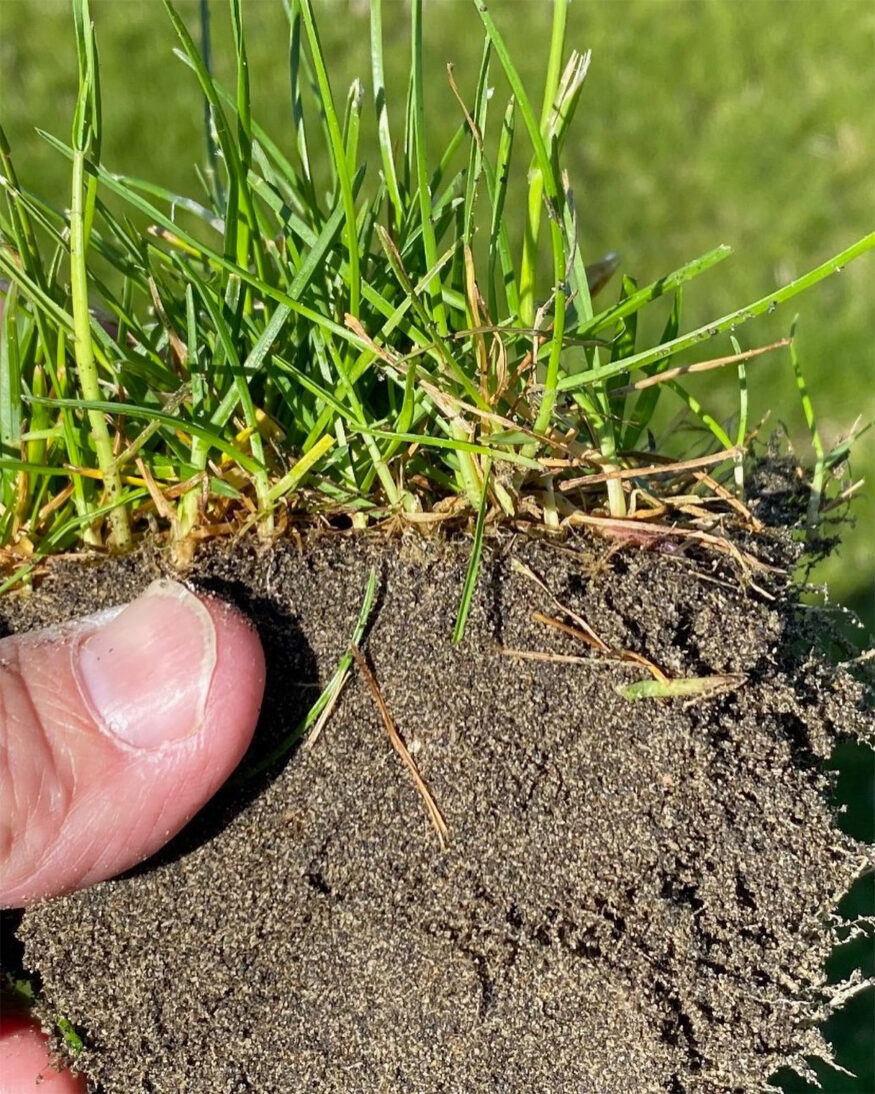 Source: mtnviewseeds on Instagram
Source: mtnviewseeds on Instagram| Also Known As | Poa pratensis L. |
| Type of Grass | Cool season perennial |
| Optimal Zones | Northern cool season zone, transition zones |
| Root Structure | Shallow |
| Winter Hardiness | Excellent |
| Shade Tolerance | Poor to Good |
| Water Requirements | High |
| Drought Tolerance | Poor |
| Self Repair Capacity | Excellent |
| Overall Maintenance Requirements | High |
Why Kentucky Bluegrass Is The Most Popular Choice For West Virginia
Kentucky bluegrass is a popular choice for lawns in West Virginia due to its ability to thrive in the state’s cool climate. It has a beautiful dark green color, fine texture, and creates a lush lawn that will be the envy of your neighbors.
This grass type is known for its excellent cold tolerance and deep root system, which allows it to withstand colder temperatures and bounce back from winter dormancy.
In West Virginia, Kentucky bluegrass is best suited for areas with full sun to partial shade and can tolerate a variety of soil conditions. However, it does best in well-drained, fertile soil with a pH between 6.0 and 7.0. One of the drawbacks of this grass type is the slightly longer establishment period compared to other cool-season grasses like ryegrass and tall fescue.
To sow Kentucky bluegrass seeds, choose either early fall or spring as the ideal planting time since cool temperatures and moderate rainfall will aid in seed germination. Prepare your soil by removing any weeds and debris, and ensuring adequate soil moisture. Spread the seeds evenly across your yard and water regularly, keeping the soil consistently moist until the grass is well-established.
Caring for your Kentucky bluegrass lawn includes mowing to a height of 2.5 to 3 inches and providing regular watering, especially during the hot summer months. Fertilization with nitrogen will also help keep your lawn healthy, and overseeding in the early fall or spring can improve its thickness and wear resistance.
While Kentucky bluegrass is resilient, some issues to watch out for are diseases, insects, and pests. Fine fescues might be a better alternative if your lawn is in a heavily shaded area, as they are more shade-tolerant than Kentucky bluegrass.
Kentucky bluegrass is a fantastic grass choice for many homeowners in West Virginia who desire a luxurious, dark green lawn. Its versatility, beauty, and ability to adapt to the state’s climate make it an ideal option for creating a stunning outdoor space that you can enjoy year-round.
Here are two recommended Kentucky bluegrass seed options available on Amazon:
- Outsidepride Midnight Kentucky Bluegrass Seed Blend
- Jonathan Green Blue Panther Kentucky Bluegrass Grass Seed
Learn More: Read our comprehensive state-by-state grass selection guides here.
Perennial Ryegrass
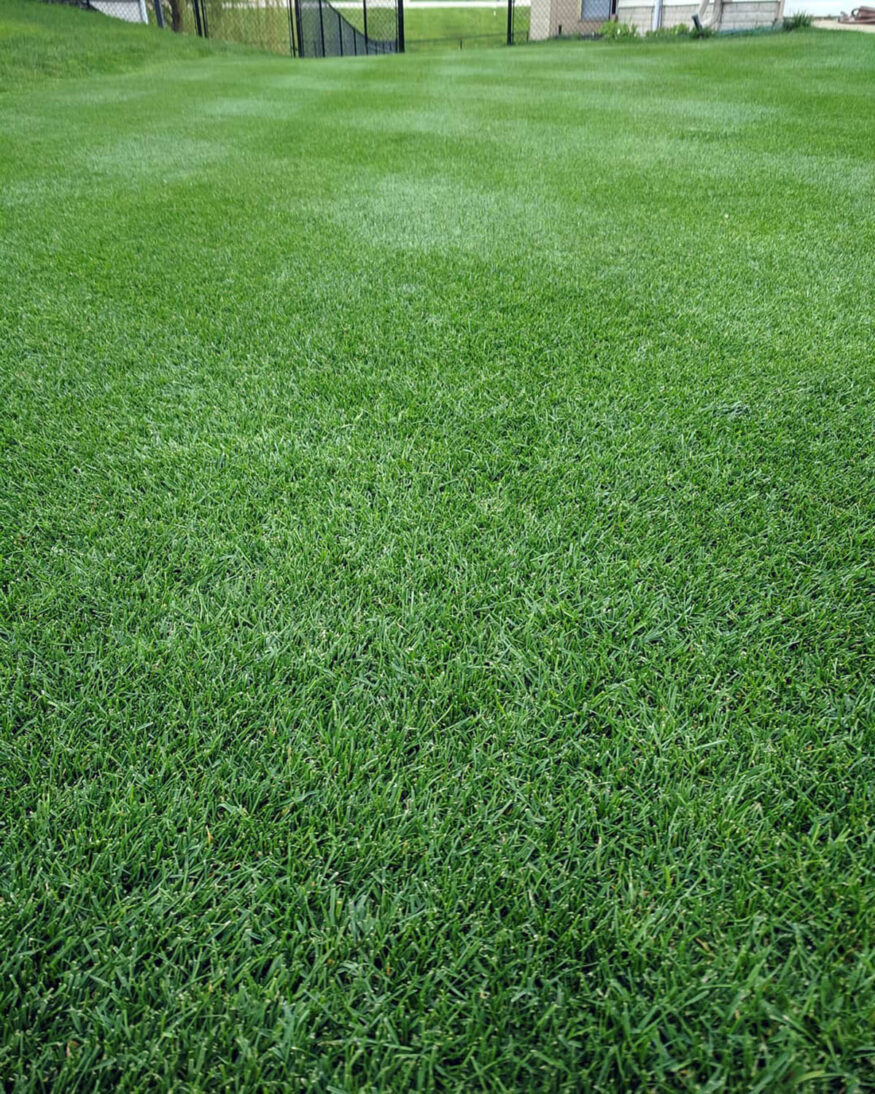 Source: ryanknorrlawncare on Instagram
Source: ryanknorrlawncare on Instagram| Also Known As | Lolium perenne L. |
| Type of Grass | Cool season perennial |
| Optimal Zones | Mild northern zones |
| Root Structure | Deep |
| Winter Hardiness | Good to excellent |
| Shade Tolerance | Moderate |
| Water Requirements | High |
| Drought Tolerance | Good |
| Self Repair Capacity | Excellent wear tolerance |
| Overall Maintenance Requirements | Moderate to high |
What Makes Perennial Ryegrass A Great Grass For West Virginia
Perennial ryegrass is a popular choice for lawns in West Virginia due to its quick establishment and outstanding wear tolerance. It can perform well in both full sun and partial shade, making it versatile for various lawn conditions.
As a cool-season grass, it thrives in the moderate climate of West Virginia, especially in regions with higher elevation like the mountains.
This grass type is known for its fine leaf texture and dense growth, which gives your lawn a lush and visually appealing appearance. Perennial ryegrass also adapts well to various soil types and has cold tolerance, allowing it to survive West Virginia’s chilly winters.
One downside to consider is its relatively shallow root system when compared to Kentucky bluegrass or tall fescue, which can make it less drought-tolerant. Additionally, perennial ryegrass might require more frequent mowing during the growing season due to its rapid growth.
To sow perennial ryegrass, prepare your soil by removing any weeds and debris. Then, distribute the grass seed evenly across the area and rake it into the soil. Water the newly planted seeds gently but thoroughly, ensuring the soil remains moist until germination.
Caring for your perennial ryegrass lawn includes regular mowing, keeping the lawn height around 2-3 inches, and watering it deeply but infrequently. This will help promote a deep root system and maintain the grass’s health. Additionally, applying fertilizer in the spring and fall will provide necessary nutrients for optimal growth.
Perennial ryegrass is a suitable choice for West Virginian homeowners who desire a beautiful and durable lawn. With proper care and maintenance, you can enjoy a lush and thriving lawn throughout the year.
Two of our recommended Perennial Ryegrass seed options are:
Looking for the best grass seed for your region?
Our smart lawn plans are designed to work perfectly with your local soil and climate conditions, without any of the toxic stuff.
Use the code EHG20 for an instant $20 discount!
- Personalized lawn care: Custom lawn plans based on soil analysis, climate data, and your specific lawn needs.
- Convenience with a conscience: Products that are not only easy to use but also safe for you, your pets, and the planet.
- Science-backed formulas: Bio-based formulas contain effective, natural ingredients like seaweed, molasses, and iron.
- Expert support: Get one-on-one guidance from a real person and rest easy with Sunday's satisfaction guarantee.
Fine Fescue
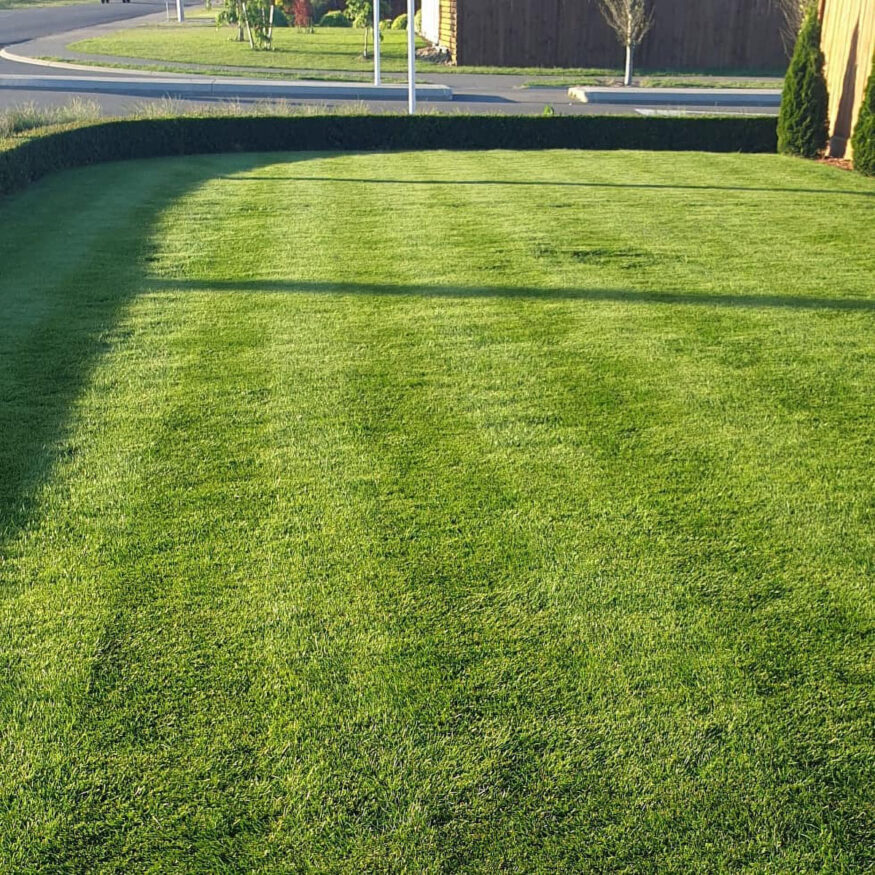 Source: the.lawn.master.project on Instagram
Source: the.lawn.master.project on Instagram| Also Known As | Hard fescue, strong creeping red fescue, slender creeping red fescue, sheep fescue, chewings fescue; Festuca L. |
| Type of Grass | Cool season perennial |
| Optimal Zones | Northern zones |
| Root Structure | Medium |
| Winter Hardiness | Excellent |
| Shade Tolerance | Excellent |
| Water Requirements | Medium to High |
| Drought Tolerance | Excellent |
| Self Repair Capacity | Limited |
| Overall Maintenance Requirements | Low |
Why Fine Fescue Grows well in West Virginia
This grass species is well-suited for the state’s soil and climate conditions. One main reason is that fine fescues exhibit shade tolerance, making it perfect for your lawn if it doesn’t receive full sun throughout the day.
Fine fescue is also a cool-season grass species, allowing it to establish well in the varying temperatures of West Virginia. With drought tolerance and the ability to survive in both sunny and shady areas, it’s an excellent choice for your yard.
Fine Fescue Benefits:
- Adapts to West Virginia’s climate and soil conditions easily
- Tolerant of shade, partial shade, and even full sun
- Drought-tolerant and can survive in varying soil moisture levels
However, one of the cons of fine fescue is that it may require more frequent mowing due to its bunch-type growth habit. Additionally, it’s not as wear-resistant as other grass types like Kentucky bluegrass or perennial ryegrass, so it might not be the best choice for lawns that receive heavy foot traffic.
Fine Fescue Drawbacks:
- Requires frequent mowing
- Not as wear-resistant as other grass types
Sowing Fine Fescue Seed: Planting fine fescue seeds in your lawn is best done during early fall, as the cooler temperatures help with seed germination. Make sure to prepare your soil by loosening it and removing any weeds or debris. Once the soil is prepared, evenly distribute the fine fescue seeds and lightly water your lawn to support their growth.
Caring for Fine Fescue Lawns: To keep your fine fescue lawn healthy, water it less frequently but deeply, as this grass type has better drought tolerance. Mow your lawn regularly, maintaining a mowing height of around 2.5 to 3 inches for the best results. Additionally, ensure to provide the right nutrients through proper fertilization by following the recommended schedule for nitrogen application in your area.
Here are two recommended Fine Fescue grass seed options:
Bermuda Grass
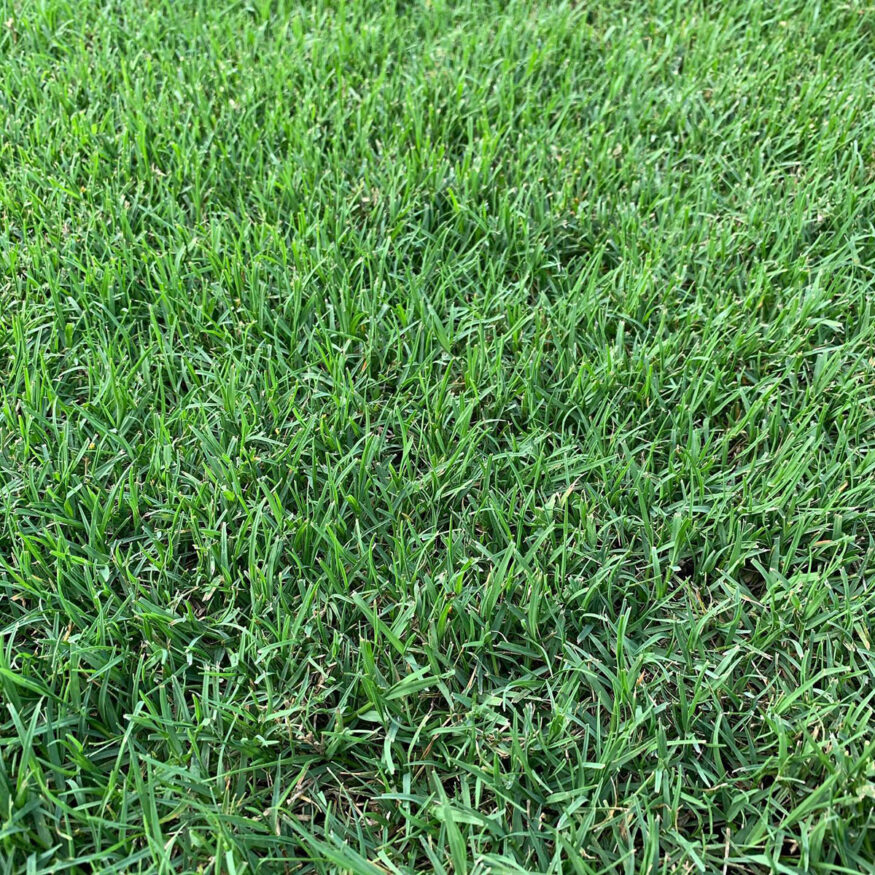 Source: sunny.bermuda on Instagram
Source: sunny.bermuda on Instagram| Also Known As | Bermuda grass, wiregrass; Cynodon dactylon L. |
| Type of Grass | Warm season perennial |
| Optimal Zones | Southern region |
| Root Structure | Deep |
| Winter hardiness | Poor |
| Heat tolerance | Excellent |
| Shade tolerance | Poor |
| Water Requirements | High |
| Drought Tolerance | High |
| Self Repair Capacity | Excellent |
| Overall Maintenance Requirements | Moderate to High |
Why Bermuda Grass Is a Popular Grass seed Choice
Bermuda grass is a warm-season grass that can potentially thrive in some parts of West Virginia, particularly in the southern regions. It has a fast-growing nature and can withstand heavy traffic, making it suitable for use in lawns, golf courses, and sports fields.
This grass type is drought-tolerant and has a deep root system, so it can do well in sandy soils and areas with low water availability. Although it thrives in full sun, it can also tolerate partial shade.
Beware that Bermuda grass isn’t as cold-tolerant as cool-season grasses like Kentucky bluegrass or fine fescue, which are more prevalent in West Virginia.
To sow Bermuda grass in your yard, you should first prepare the soil by removing weeds and debris, then loosen it to a depth of 4 to 6 inches. Next, apply a layer of compost or organic matter to improve soil fertility and moisture retention. When selecting grass seed, opt for a blend containing Bermuda grass along with compatible cool-season grasses like ryegrass or tall fescue.
Plant the seeds in late spring or early summer when soil temperatures are consistently above 65°F. Water the lawn frequently after seeding to keep the soil moist until the grass establishes itself. Maintain a mowing height of about 1.5 to 2 inches during the growing season to encourage denser growth and reduce the risk of weeds and pests.
Keep in mind that Bermuda grass may require more frequent mowing and higher nitrogen fertilization compared to cool-season grasses. Additionally, it may go dormant and turn brown during winter months. To maintain a green lawn throughout the year, consider overseeding your Bermuda grass with compatible cool-season grasses in the fall.
If you live in southern West Virginia, Bermuda grass might be a suitable option for a lush, hardy lawn. Be prepared to invest time in proper planting, watering, mowing, and fertilization to keep your Bermuda grass looking its best.
Our recommendations for Bermudagrass Seed are:
West Virginia’s Climate And Growing Challenges For Lawns
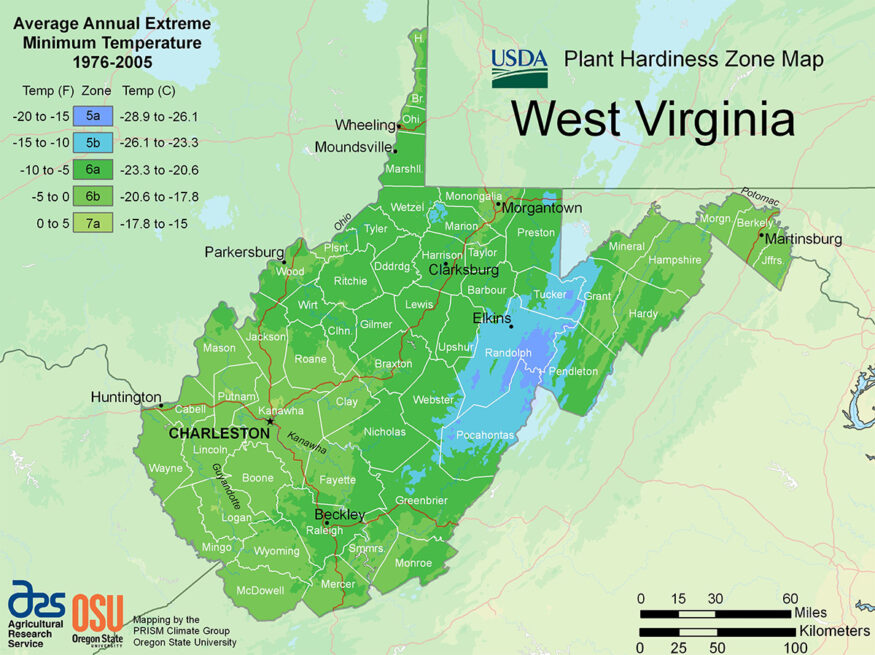
Climate
West Virginia experiences four distinct seasons with cool temperatures in the spring and fall, making it best to plant cool-season grasses like fine fescue, perennial ryegrass, and Kentucky bluegrass. Summer heat can stress your lawn, so it’s important to provide adequate water during this time.
Soil Conditions
Your soil may range from sandy soils to heavy clay. To improve your lawn’s health and appearance, test your soil’s pH level and adjust it using lime or sulfur. Amend your soil with organic matter to improve its structure and moisture retention.
Weeds
Weeds compete with your grass for nutrients and water. Use proper mowing practices, such as keeping your grass at the recommended height, to discourage weed growth. Employ pre-emergent and post-emergent weed killers if necessary.
Pests & Diseases
Insects like grubs can damage your lawn’s roots, while diseases like brown patch may threaten your grass’ health. Keep an eye out for signs of pest or disease infestation and treat promptly.
Apply preventative measures, like maintaining good soil health and proper watering habits, to minimize problems.
Other Challenges
- Drought tolerance: Select drought-tolerant grass species like tall fescue or fine fescues, and water deeply and infrequently to help your lawn survive dry periods.
- Shade: For shady areas, choose shade-tolerant grasses like fine fescue. Prune trees to let more sunlight reach your lawn.
- Wear: If your lawn receives heavy foot traffic, consider planting grass types with high wear tolerance like perennial ryegrass to maintain a lush appearance.
- Overseeding: Overseed thin or bare areas with a blend of grass seed that thrives in your lawn’s specific conditions to promote a thicker, healthier yard.
Looking for the best grass seed for your region?
Our smart lawn plans are designed to work perfectly with your local soil and climate conditions, without any of the toxic stuff.
Use the code EHG20 for an instant $20 discount!
- Personalized lawn care: Custom lawn plans based on soil analysis, climate data, and your specific lawn needs.
- Convenience with a conscience: Products that are not only easy to use but also safe for you, your pets, and the planet.
- Science-backed formulas: Bio-based formulas contain effective, natural ingredients like seaweed, molasses, and iron.
- Expert support: Get one-on-one guidance from a real person and rest easy with Sunday's satisfaction guarantee.
